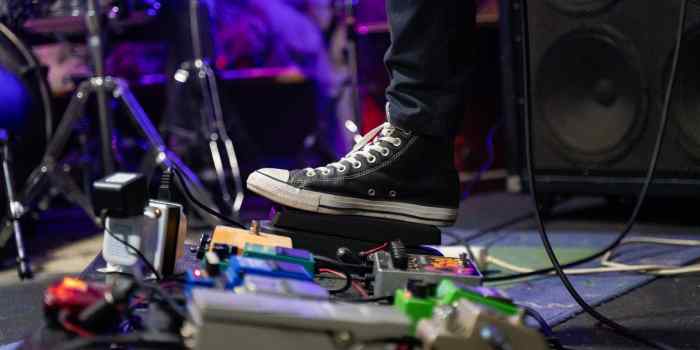Hey there, fellow music lovers and guitar players! You know that tuning your guitar is one of the most crucial steps, right? But did you know that guitar pedals can play a significant role in achieving the perfect tune? Well, in this article, I’ll tell you how guitar pedals work for tuning and how they can make your tuning experience easy and enjoyable.
So, grab your guitar, and let’s dive into this musical journey!
The Basics of Guitar Pedals

Before we get into the details of tuning with guitar pedals, let’s start with the basics. Guitar pedals are small electronic devices that you can place on the floor or on a pedalboard. They’re designed to change and enhance the sound of your guitar in various ways. While many people think of pedals for cool effects like distortion or reverb, they can also be super helpful for tuning.
Types of Tuning Pedals
Now, let’s talk about the different types of tuning pedals. Two main kinds are mostly used:
Chromatic Tuners
Chromatic tuners are the most common type of tuning pedals. They work by figuring out the pitch of the note you’re playing and showing it on a screen. Most chromatic tuners have lights that tell you if your string is too high, too low, or just right.
Polyphonic Tuners
Polyphonic tuners are a bit fancier. You can strum all your guitar strings at once, and the pedal quickly tells you which ones need adjusting. This makes tuning faster, which is awesome, especially if you’re playing live.
How Guitar Pedals Work For Tuning
Now that we know what kinds of tuning pedals are out there, let’s talk about how they help you keep your guitar in tune.
Accuracy and Speed
Tuning pedals are like tuning ninjas. They’re super accurate and speedy. Other ways of tuning, like using a tuning fork or an app, might not be as spot-on. Tuning pedals make sure every string is just right, so your guitar sounds amazing.
Noise Reduction
Imagine you’re on a noisy stage trying to tune your guitar. Tricky, right? That’s where tuning pedals come to the rescue. They filter out all that background noise, so you can focus on getting your guitar perfectly in tune.
Convenience
Tuning pedals are a breeze to use, especially when you’re performing live. They’re user-friendly, with easy-to-see displays, even on a dimly lit stage. With a simple tap of your foot, you can check and adjust your tuning without missing a beat.
Tips for Using Tuning Pedals Effectively
Now, here are some tips to make sure you get the most out of your tuning pedal:
Calibrate Your Tuner
Before you start using your tuning pedal, make sure it’s set up just right. This ensures that your reference pitch is accurate, which is crucial for getting your guitar perfectly in tune.
Check Your Battery
If your tuning pedal runs on batteries, always keep spares handy. You wouldn’t want your pedal to run out of juice in the middle of a gig!
Double-Check Your Tuning
Even with a trusty tuning pedal, it’s always a good idea to use your ears too. Listen closely to make sure your guitar sounds just the way you want it to.
Speaking of getting your guitar perfectly in tune, if you’re just starting your guitar journey, you might also find our Fingerstyle Guitar Playing Guide quite helpful. Check it out for some valuable insights into mastering fingerstyle techniques.
Conclusion
Hopefully, now you know how guitar pedals work for you tuning how they can be your best friend when it comes to tuning. So, whether you’re a seasoned musician or just starting on your guitar journey, a tuning pedal is a valuable tool to have. It ensures your guitar always sounds fantastic so that you can play your heart out with confidence.
FAQs
While many guitar pedals can tune, it’s best to get a dedicated chromatic or polyphonic tuner for the most accurate results.
Tune your guitar every time you play, as changes in temperature and humidity can affect your guitar’s tuning.
Absolutely! Tuning pedals work for various stringed instruments like bass guitars and ukuleles.
Having a pro set up and tuning your guitar can be handy, especially for recording or high-level performances. But for everyday use, a tuning pedal works great.
Yes, tuning pedals are beginner-friendly. They give you clear visual feedback, making it easier for newcomers to get their guitars perfectly in tune.